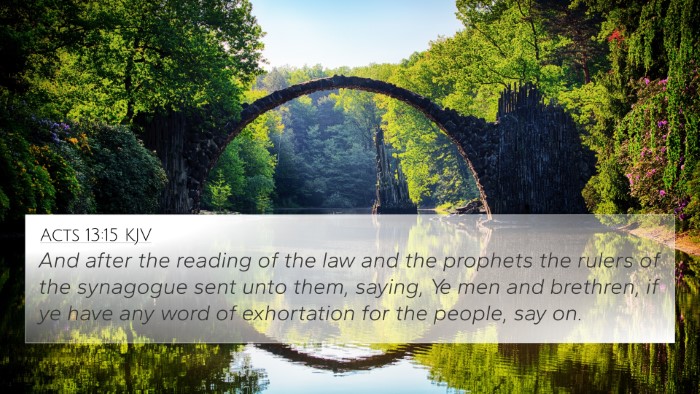Understanding 1 Corinthians 14:3
1 Corinthians 14:3 states, "But he that prophesieth speaketh unto men to edification, and exhortation, and comfort." This verse emphasizes the significance of prophetic speech within the Christian community, delineating its purpose and nature. Through this exploration, we will reference insights from respected public domain commentaries to provide a thorough understanding of this scripture.
Meaning and Interpretation
This scripture is pivotal in understanding the role of prophecy in the church and how it serves the congregation. The Apostle Paul, in this epistle, contrasts the gift of prophecy with speaking in tongues, and outlines that prophecy is meant for the edification of believers.
Key Insights from Public Domain Commentaries
- Matthew Henry:
According to Henry, the essence of prophecy is not merely foretelling future events but rather communicating God's messages for instruction. He emphasizes that prophecy is intended to build up the church through teaching and encouraging believers in their faith.
- Albert Barnes:
Barnes elaborates that speaking unto men through prophecy involves delivering messages that are practical, relevant, and applicable to the lives of believers. It builds them up spiritually, encourages them during trials, and comforts them in distress, calling attention to the foundational role prophecy plays in Christian life.
- Adam Clarke:
Clarke notes that the purpose of prophecy outlined in this verse is tri-fold: to 'edify', 'exhort', and 'comfort'. He suggests that true prophetic messages address the entire being of a person, fortifying them in faith, offering fervent pleas for spiritual growth, and providing solace in times of grief or doubt.
Connecting 1 Corinthians 14:3 with Other Scriptures
This verse has a significant number of cross-references, enhancing our understanding of its themes. Below are relevant Bible verses that connect to 1 Corinthians 14:3:
- Ephesians 4:29: "Let no corrupt communication proceed out of your mouth, but that which is good to the use of edifying, that it may minister grace unto the hearers." This verse parallels the purpose of prophecy to provide edification.
- 1 Thessalonians 5:11: "Wherefore comfort yourselves together, and edify one another, even as also ye do." Both verses stress the importance of building each other up.
- Romans 14:19: "Let us therefore follow after the things which make for peace, and things wherewith one may edify another." Connecting the call to pursue peace with edifying speech.
- 1 Peter 4:10: "As every man hath received the gift, even so minister the same one to another, as good stewards of the manifold grace of God." This supports the concept of using spiritual gifts for mutual edification.
- Hebrews 10:24-25: "And let us consider one another to provoke unto love and to good works: Not forsaking the assembling of ourselves together." This reflects the communal aspect of instruction and comfort.
- 2 Timothy 3:16-17: "All scripture is given by inspiration of God, and is profitable for doctrine, for reproof, for correction, for instruction in righteousness." Illustrating the importance of teaching and edification found in scripture.
- Colossians 3:16: "Let the word of Christ dwell in you richly in all wisdom; teaching and admonishing one another in psalms and hymns." Highlighting the role of teaching as an extension of prophecy.
Combining Insights: Thematic Connections
The thematic connections of 1 Corinthians 14:3 extend beyond mere instruction; they encompass emotional and spiritual support through community interactions. Prophetic utterances are seen explicitly as tools for:
- Edification: Building up the faith of community members.
- Exhortation: Encouraging believers to remain steadfast and motivated in their spiritual walk.
- Comfort: Offering solace during trials, reflecting God's care and involvement in their lives.
Comparative Bible Verse Analysis
Through comparative Bible verse analysis, we can discern how the concept presented in 1 Corinthians 14:3 resonates throughout various parts of both the Old and New Testaments. The ability to cross-reference these scriptures efficiently utilizes tools like a Bible concordance or Bible cross-reference guide.
Cross-Referencing Biblical Texts
Utilizing a cross-reference Bible study method allows for a deeper understanding of the inter-Biblical dialogue. It reveals consistent themes of God’s intention for believers to support one another through edifying speech and actions. This establishes a network of connections between disparate biblical narratives, demonstrating a unified voice on the essence of prophecy.
Tools for Effective Bible Study
For those seeking to delve deeper into the scriptures, various Bible reference resources are available. They can enhance your study through:
- Comprehensive Bible cross-reference materials: Explore complex themes and ideas present across biblical texts.
- How to use Bible cross-references: Learning identification and application of relevant verses enhances the understanding of scripture.
- Bible chain references: Following themes through linked verses gives insight into God’s overarching plans and purposes.
Conclusion
In summary, 1 Corinthians 14:3 serves as a foundational scripture on the function of prophecy within the church, promoting edification, exhortation, and comfort. By leveraging the insights from established public domain commentaries combined with extensive cross-referencing of biblical texts, a richer understanding of this verse and its applications in Christian life emerges.
Key Takeaway: Understanding and embracing the role of prophecy and supportive communication among believers is crucial for fostering a loving and mature church community.


























